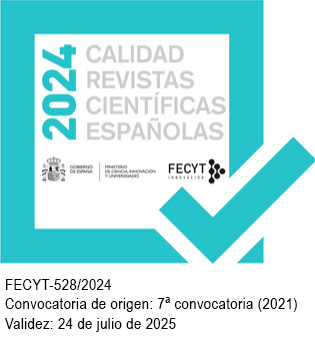Generativismo y minimimalismo: ¿cuál es la teoría y cuál el programa?
https://doi.org/10.31810/rsel.52.2.1
Palabras clave:
Gramática generativa; programa minimalista; programa biolingüístico; teoría gramaticalResumen
Chomsky y sus seguidores suelen presentar el minimalismo lingüístico como un «programa», en el sentido de que se limita a introducir unas líneas maestras para la elaboración de teorías gramaticales propiamente dichas. De acuerdo con esta interpretación ortodoxa, a estas teorías cabe atribuirles un contenido fáctico, es decir, expuesto a falsación empírica, pero el programa como tal es inmune a este tipo de refutación. Este artículo rebate esta visión del «programa» minimalista y plantea una reconceptualización tanto del minimalismo como del generativismo en sus diferentes fases de desarrollo. Según esta propuesta, la tesis minimalista tiene un contenido fáctico y el minimalismo, aunque puede calificársele trivialmente como programático, un carácter ineludiblemente teórico.
Descargas
Citas
Balari, S., Lorenzo, G. y Sultan, S. (2020). Language acquisition and eco-devo processes: The case of the lexicon-syntax interface. Biological Theory 15, 148-160. doi: https://doi.org/10.1007/s13752-020-00352-9
Behme, C. (2015). Is the ontology of biolinguistics coherent? Language Sciences 47, 32-42. doi: https://doi.org/10.1016/j.langsci.2014.07.012
Berwick, R. C., y Chomsky, N. (2011). The biolinguistics program: the current state of its development, en A.M. di Sciullo y C. Boeckx (Eds.), The biolinguistic enterprise. New perspectives on the evolution and nature of the human language faculty (pp. 19-41), Oxford: Oxford University Press.
Berwick, R. C., y Chomsky, N. (2016). Why only us. Language and evolution. Cambridge, MA: MIT Press.
Berwick, R. C., Friederici, A. D., Chomsky, N. y Bolhuis, J. J. (2013). Evolution, brain, and the nature of language. Trends in Cognitive Science 17, 89–98. doi: https://doi.org/10.1016/j.tics.2012.12.002
Berwick, R. C., Pietroski, P., Yankama, B. y Chomsky, N. (2011). Poverty of stimulus revisited. Cognitive Science. A Multidisciplinary Journal 35(7), 1207-1242. doi: https://doi.org/10.1111/j.1551-6709.2011.01189.x
Boeckx, C. (2015). Un-Cartesian (bio-)linguistics. Teorema 34(1), 161-186. https://www.jstor.org/stable/i40148914
Boeckx, C. y Uriagereka, J. (2007). Minimalism, en G. Ramchand y Ch. Reiss (Eds.), The Oxford handbook of linguistic interfaces (pp. 541-573), Oxford: Oxford University Press.
Chomsky, N. (1955/75). The logical structure of linguistic theory. Nueva York: Plenum.
Chomsky, N. (1965). Aspects of the theory of syntax. Cambridge, MA: MIT Press (citado por la traducción de Carlos-Peregrín Otero. 1999. Aspectos de la teoría de la sintaxis. Barcelona: Gedisa).
Chomsky, N. (1966). Cartesian linguistics. A chapter in the history of rationalist thought. Nueva York: Harper & Row (citado por la traducción de Enrique Wulf. 1969. Lingüística cartesiana. Un capítulo de la historia del pensamiento racionalista. Madrid: Gredos).
Chomsky, N. (1968). Quine’s empirical assumptions. Synthese 19(1/2), 53-68. https://www.jstor.org/stable/20114630
Chomsky, N. (1970). Remarks on nominalization, en R. Jabobs y P. Rosenbaum (Eds.), Readings in English transformational grammar (pp.184-221), Waltham, MA: Ginn and Co.
Chomsky, N. (1972). Some empirical issues in the theory of transformational grammar, en Studies on semantics in generative grammar (pp. 120-202), La Haya: Mouton.
Chomsky, N. (1973). Conditions on transformations, en S.R. Anderson y P. Kiparsky (Eds.), A Festschrift for Morris Halle (pp. 232-286), Nueva York: Holt, Rinehart & Winston.
Chomsky, N. (1975). Reflections on language. Nueva York: Pantheon (citado por la traducción de Joan A. Argente y Josep M. Nadal. 1979. Reflexiones sobre el lenguaje. Bareclona: Ariel).
Chomsky, N. (1980). Rules and representations. Nueva York: Columbia University Press.
Chomsky, N. (1981). Lectures on government and binding. Dordrecht: Foris.
Chomsky, N. (1991). Some notes on economy of derivation and representation, en R. Freidin (Ed.), Principles and parameters in comparative grammar (pp. 415-454), Cambridge, MA: MIT Press (citado por la traducción de Juan Romero. 1999. Algunas notas sobre la economía de la derivación y la representación, en N. Chomsky, El programa minimalista (pp. 23-79), Madrid: Alianza).
Chomsky, N. (1993). A minimalist program for linguistic theory, en K. Hale y S. J. Keyser (Eds.), The view from Building 20. Essays in linguistics in honor of Sylvain Bromberger (pp. 1-52), Cambridge, MA: MIT Press (citado por la traducción de Juan Romero. 1999. Un programa minimalista para la teoría lingüística, en N. Chomsky, El programa minimalista (pp. 81-152), Madrid: Alianza).
Chomsky, N. (2000). Minimalist inquiries: the framework, en R. Martin, D. Michaels y J. Uriagereka (Eds.), Step by step. Papers in minimalist syntax in honor of Howard Lasnik (pp. 89-155), Cambridge, MA: MIT Press (citado por la traducción de Víctor M. Longa. 1999. Indagaciones minimalistas: el marco. Moenia 5, 69-126).
Chomsky, N. (2004). Beyond explanatory adequacy, en A. Belletti (Ed.), Structures and beyond. Volume 3: The cartography of syntactic structures (pp. 104-131), Oxford: Oxford University Press.
Chomsky, N. (2005). Three factors in language design. Linguistic Inquiry 36(1), 1-22. doi: https://doi.org/10.1162/0024389052993655
Chomsky, N. (2007). Approaching UG from below, en U. Sauerland y H.-M. Gärtner, (Eds.), Interfaces + recursion = language? Chomsky’s minimalism and the view from syntax-semantics (pp. 1-30), Berlín: De Gruyter Mouton.
Chomsky, N. (2013). Problems of projection. Lingua 130, 33-49. doi: https://doi.org/10.1016/j.lingua.2012.12.003
Chomsky, N. (2016). What kind of creatures are we? Nueva York: Columbia University Press.
Chomsky, N. (2019). Some puzzling foundational issues: The Reading program. Catalan Journal of Linguistics, Special Issue, 263-285. doi: http://doi.org/10.5565/rev/catjl.287
Christiansen, M. y Chater, N. (2016). Creating language. Integrating development, acquisition, and processing. Cambridge; MA: MIT Press.
Deacon, T. W. (1997). The symbolic species. The co-evolution of language and the brain. Nueva York: W.W. Norton.
Eguren, L. y Fernández Soriano, O. (2004). Introducción a una sintaxis minimista. Madrid: Gredos.
Fodor, J. A. (1975). The language of thought. Cambridge, MA: Harvard University Press.
Fodor, J. A. (1980). The modularity of mind. Cambridge, MA: MIT Press.
Fodor, J. A. (2000). The mind doesn’t work that way. The scope and limits of computational psychology. Cambridge, MA: MIT Press.
Gallego, Á. J. (2022). Manual de sintaxis minimista. Madrid: Akal.
Grimshaw, J. (1990). Argument structure. Cambridge, MA: MIT Press.
Hale, K. y Keyser, S. J. (2002). Prolegomenon to a theory of argument structure. Cambridge, MA: MIT Press.
Hinzen, W. (2014). What is un-Cartesian linguistics? Biolinguistics 8, 226-257. https://www.biolinguistics.eu/index.php/biolinguistics/article/view/323
Hornstein, N., Nunes, J. y Grohmann, K. K. (2005). Understanding minimalism. Cambridge: Cambridge University Press.
Huang, Ch.-T. J. (1982). Logical relations in Chinese and the theory of grammar. Tesis Doctoral, MIT.
Jackendoff, R. (1977). X’ syntax. A study of phrase structure. Cambridge, MA: MIT Press.
Kuhn, T.S. (1962). The structure of scientific revolutions. Chicago: University of Chicago Press.
Lakatos, I. (1978). The methodology of scientific research programs. Philosophical papers. Volume I. Cambridge: Cambridge University Press (citado por la traducción de Juan Carlos Zapatero. 1983. La metodología de los programas de investigación científica. Madrid: Alianza).
Lappin, S., Levine D. y Johnson, D.E. (2000). The structure of unscientific revolutions. Natural Language & Linguistic Theory 18(3), 665-671. doi: https://doi.org/10.1023/A:1006474128258
Lohndal, T. y Uriagereka, J. (2017). Third factor explanations and Universal Grammar, en I. Roberts (Ed.), The Oxford handbook of Universal Grammar (pp. 114-128), Oxford: Oxford University Press.
Longa, V. M. y Lorenzo, G. (2008). What about a (really) minimalist theory of language acquisition? Linguistics 46(3), 541-570. doi: https://doi.org/10.1515/LING.2008.018
Longa, V. M. y Lorenzo, G. (2012). ¿Reduce, complete o elimina? Sobre el estatus del Programa Minimalista en la gramática generativa. Revista Española de Lingüística 42(1), 145-174. http://revista.sel.edu.es/index.php/revista/article/view/12
Lorenzo, G. (2016). What is it like to be a human being? Language design and its implications for the «human nature» debate. Teorema 35(3), 219-232. https://www.jstor.org/stable/44077420
Martin, R. y Uriagereka, J. (2000). Some possible foundations of the Minimalist Program, en R. Martin, D. Michaels y J. Urigereka (Eds.), Step by step. Papers in minimalist syntax in honor of Howard Lasnik (pp. 1-29), Cambridge, MA: MIT Press.
O’Grady, W. (2012). Three factors in the design and acquisition of language. WIREs Cognitive Science 3(5), 494-499. doi: https://doi.org/10.1002/wcs.1188
Postal, P. M. (2004). Skeptical linguistic essays. Oxford: Oxford University Press.
Quine, W. V. O. (1953). From a logical point of view. Cambridge, MA: Harvard University Press (citado por la traducción de Manuel Sacristán. 2002. Desde un punto de vista lógico. Barcelona: Gedisa).
Quine, W. V. O. (1975). Mind and verbal dispositions, en S. Guttenplan (Ed.), Mind and language (pp. 83-95). Oxford: Oxford University Press.
Reboul, A. (2017). Hinzen’s un-Cartesian linguistics. Theoretical Linguistics 43(3-4), 261-270. doi: https://doi.org/10.1515/tl-2017-0017
Rizzi, L. (2016). The concept of explanatory adequacy, en I. Roberts (Eds.), The Oxford handbook of Universal Grammar (pp. 97-113), Oxford: Oxford University Press.
Ross, J. (1967). Constraints on variables in syntax. Tesis Doctoral, MIT.
Thomas, M. (2020). On the reception and revivification of Cartesian linguistics, en É. Aussant y J.-M. Fortis (Eds.), History of linguistics 2007. Selected papers from the 14th International Conference on the History of the Language Sciences (ICHOLS 14), Paris, 28 August-1 September (pp. 157–169), Ámsterdam: John Benjamins.
Uriagereka, J. (1996). Formal and substantive elegance in the minimalist program, en Ch. Wilder, H.-M. Gärtner y M. Bierwisch (Eds.), The role of economy principles in linguistic theory (pp. 170-204), Berlín: Akademie Verlag.
Williams, E. (1994). Thematic structure in syntax. Cambridge, MA: MIT Press.
Publicado
Cómo citar
Número
Sección
Derechos de autor 2022 Revista Española de Lingüística

Esta obra está bajo una licencia internacional Creative Commons Atribución-NoComercial-SinDerivadas 4.0.











